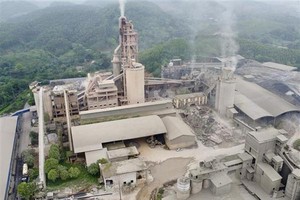 Prime Minister Pham Minh Chinh chairs the teleconference on the development of the labor market
Prime Minister Pham Minh Chinh chairs the teleconference on the development of the labor market
The Prime Minister made the statement at today’s nationwide teleconference on the development of the labor market in a flexible and sustainable and globally integrated manner.
At the conference, Chairman of the Vietnam Confederation of Trade and Industry (VCCI) Pham Tan Cong said that the PCI 2021 report conducted by VCCI shows that when businesses have plans to replace or expand recruitment, businesses can easily recruit workers and unskilled workers with 62 percent and accountants with 42 percent, technical staff with 25 percent and managers and supervisors with 20 percent. However, businesses have bumped into difficulty in recruiting executives with 15 percent.
In fact, Vietnam is amidst the golden population structure period, the most balanced development stage of each country when the proportion of the labor force is double the number of dependents, but the quality of labor is not yet good. The rate of workers with degrees and certificates is only 26.1 percent whereas most laborers are untrained with low income, and they have not yet met the requirements of employers and the labor market.
Subsequently, a VCCI representative recommended that in the immediate future, the policy on training support workers to help them maintain jobs when facing difficulties due to the prolonged Covid-19 pandemic; plus, it needs to extend the implementation time and adjust the conditions for more businesses and workers’ participation.
VCCI proposed to the National Assembly and the Government to consider providing income tax reduction incentives for enterprises conducting internal training programs at enterprises that meet the standards of internal training in enterprises.
Mr. Nguyen Van Than, Chairman of the Association of Small and Medium Enterprises, advocated the reduction of corporate income tax for small and medium-sized enterprises which can prove that they provide training to employees.
Currently, the Law on Vocational Education only stipulates incentives for businesses that have established vocational training centers/schools/institutions under enterprises and these institutions must operate as professional training facilities.
Mr. Nguyen Van Than also suggested studying a flexible salary model, for example, employees can advance a salary when they urgently need money. This flexible salary model is expected to help employees not ask for money with a high interest rate. Moreover, the government should study and develop industrial cities as many countries have done to create favorable conditions for workers to live and work.
On the side of businesses, a representative of ManpowerGroup Vietnam commented that just over 86 percent of Vietnamese workers are able to work remotely, which leads to the ability of workers to respond to new employment conditions is quite low. The percentage of workers with skilled skills accounts for only 11 percent, showing that the professional skills of workers are still low, not meeting the needs of enterprises, especially in the context of integration when the labor market requires highly-skilled workers increasingly.
Furthermore, only 5 percent of employees can speak English; as a result, the competitiveness of the Vietnamese workforce is not as good as their peers in other countries. The average monthly salary of Vietnamese workers is about US$300 (about VND7 million), much lower than workers in the region with $1,992 and the world with $ 2,114.
Worse, Vietnamese workers face many limitations when businesses put new technologies into production, and the adaptability and responsiveness of workers are still low. Also according to a survey by Manpower, 57 percent of businesses are having difficulties in recruiting.
ManpowerGroup suggested that education and training institutions need to improve some programs, there should be a close connection between businesses and training institutions to create outputs for students, connecting students with businesses right from the start while they are at school. If salary was the most important factor to attract workers in the past, many factors are now needed to retain workers such as remuneration, working environment, skills development opportunities, and many other flexible policies.
Speaking at the conclusion of the conference, Prime Minister Pham Minh Chinh emphasized that if the country has developed industries, apply science and technology, own new inventions, inventions, and most advanced technologies, enterprises should focus on training regularly with breakthroughs in order to acquire high-quality labor and master technology.
Pointing to the current limitations of the Vietnamese labor market, the Prime Minister emphasized solutions, such as promoting the development of employment policies on the principles of forecasting, strategic vision, initiative and appropriateness. with the market mechanism. Currently, the recovery and development program is spending about VND 2,000 billion for training, vocational training, and job creation and is expected to arrange more, the Government's policy is to spare no money for this effectively.
After this conference, the Prime Minister assigned the Ministry of Labor, Invalids and Social Affairs to conduct studies on how to mobilize resources on developing the labor market in the right direction and flexibility, and later soon submit to the Government and the Prime Minister for promulgation a guiding document.
























